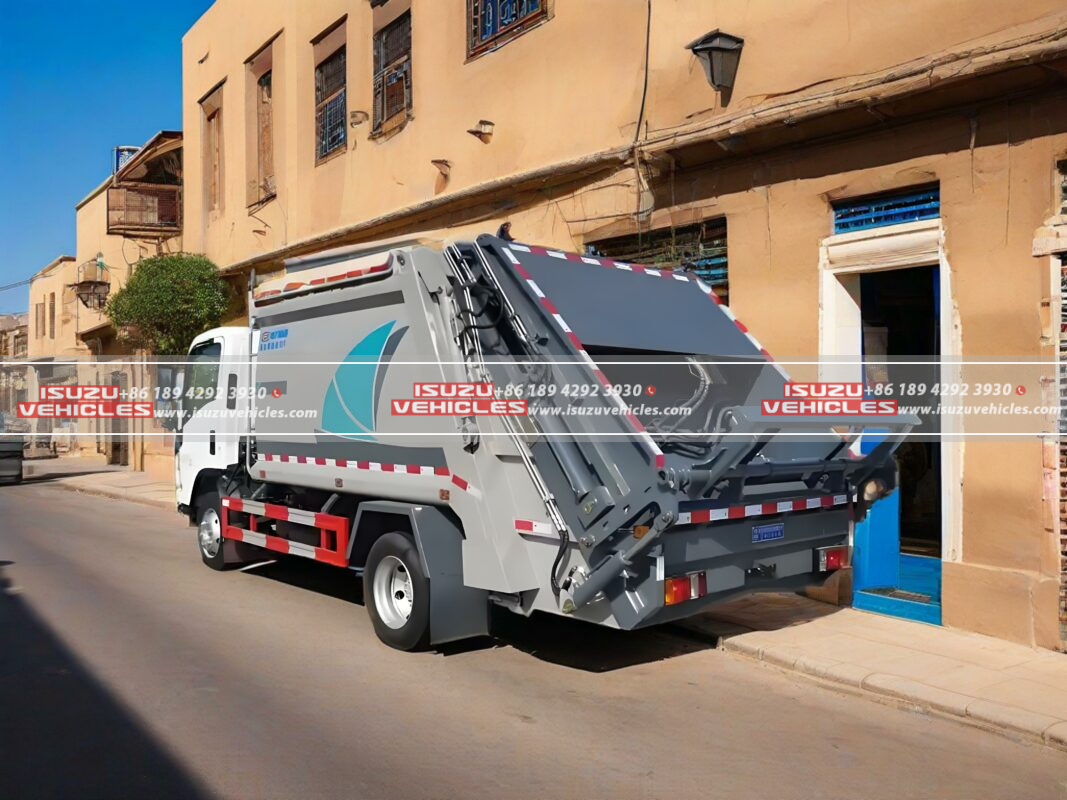Twelve governorates across Egypt have significantly upgraded their urban sanitation infrastructure following the delivery of 120 ISUZU garbage trucks, a cornerstone investment under the national “Clean Cities 2030” masterplan. This $48 million contract between ISUZU Vehicles and the Egyptian National Engineering & Automotive Group (NEA Group) addresses critical waste collection gaps in high-density neighborhoods, where aging fleets previously struggled with daily volume surges exceeding 1,800 tons in Greater Cairo alone. The deployment enables 98% route coverage reliability—a 40% improvement over legacy systems—directly supporting Egypt’s target to divert 85% of municipal solid waste from open dumps by 2028.
Engineering for Egyptian Urban Realities – Climate-Adaptive Design & Workflow Integration
Thermal Resilience & Ergonomic Innovation
Engineered specifically for Egypt’s 45°C summer extremes and congested alleyways, the trucks feature:
- Ceramic-Insulated Compaction Chambers: Reducing interior temperatures by 18°C to prevent organic waste fermentation during 12-hour shifts
- Low-Entry Hydraulic Cabins: Minimizing operator fatigue with 360° camera systems and one-touch bin-gripping controls
- Corrosion-Resistant Alloy Bodies: Withstanding Cairo’s high-humidity and salt-laden coastal air in Alexandria and Port Said
AI-Driven Operational Synchronization
Each vehicle integrates with municipal centralized waste intelligence platforms through:
“Real-time fill-level sensors triggering dynamic rerouting when containers reach 90% capacity, eliminating overflow incidents by 67%.”
- GPS-optimized collection paths avoiding morning traffic bottlenecks near schools and markets
- Automated SMS alerts to commercial entities coordinating bin placement timing
NEA Group Partnership Model – Localization & Technical Capacity Building
Assembly & Maintenance Ecosystem
Leveraging NEA Group’s Ain Sokhna Industrial Zone facilities, the partnership includes:
| Component | Localization Rate | Strategic Impact |
|---|---|---|
| Chassis Assembly | 100% | Reduced import duties saving $3.1M project-wide |
| Hydraulic Systems | 65% | 48-hour spare parts availability across governorates |
| Telematics Hardware | 30% | Secure data compliance with Egypt’s Data Sovereignty Law |
Workforce Development Framework
- Certified ISUZU technician training for 180 NEA Group engineers at the Alexandria Technical Academy
- Municipal operator certification programs featuring VR simulation modules for emergency procedures
- Predictive maintenance protocols using vibration analysis tools detecting compressor wear 300 operating hours before failure
Immediate Environmental & Public Health Impacts
Waste Diversion Metrics
Compaction ratios of 5.8:1—superior to the previous fleet’s 3.2:1—directly reduce landfill space consumption by 11,000 m³ monthly, equivalent to freeing 3.5 football fields of land annually. In Qalyubia and Gharbia governorates, this efficiency enabled:
- Elimination of 34 historical overflow blackspots near residential compounds
- 19% reduction in rodent infestation incidents validated by Health Ministry inspections
- Integration with biogas facilities converting 22 tons/day of compressed organics into renewable energy
Operational Carbon Reduction
Euro-VI compliant engines coupled with idle-reduction auto-shutdown systems curtail fleet emissions:
- 28 tons/month CO₂ reduction versus pre-2023 garbage trucks
- 93% lower PM2.5 particulate emissions during collection routes near sensitive zones (hospitals/schools)
Future-Proofing Municipal Infrastructure – The Integrated Clean Fleet Strategy
Phase 2: Mechanized Street Cleaning Expansion
Building on the garbage trucks’ telematics backbone, NEA Group will deploy complementary assets in Q4 2025:
- ISUZU Sweeper Trucks with regenerative air systems capturing sub-10-micron dust particles along Corniche thoroughfares
- ISUZU Vacuum Trucks featuring cyclone separation technology for deep-cleaning storm drains before flood seasons
Circular Economy Integration
RFID-tagged waste bins—synced with both collection and cleaning fleets—enable precise “pay-as-you-throw” billing models, incentivizing recycling participation. Governorate-level dashboards now track:
- Real-time route efficiency vs. waste generation heatmaps
- Revenue recovery rates from recyclable material streams (plastics/metals)
- Public satisfaction metrics via AI analysis of 311 service requests
With 86% of Phase 1 operational KPIs exceeded within the first quarter, this fleet has become the operational backbone for Egypt’s urban sustainability transformation—turning logistical challenges into measurable civic improvements one compressed load at a time. NEA Group’s CEO, Hatem El-Sayed, confirms advanced negotiations are underway for ISUZU electric refuse vehicles to service Red Sea resort cities by 2027.
